Scammers are relentless in their pursuit of your bank account and financial details, employing various tactics to gain access. Understanding how these scams operate is essential for safeguarding your accounts. Essentially, the primary aim of any bank scam is to infiltrate your financial resources, but scammers can only achieve this with your cooperation. They rely on you to divulge personal financial information, install harmful software on your devices, or engage with counterfeit checks and other fraudulent banking materials.

There are several standard methods scammers use to target individuals. They might send you counterfeit checks that compel you to take specific actions legally. Alternatively, they could bombard you with spam emails or deceptive text messages prompting you to reply with a login code or click on links that download malware onto your device. Another tactic involves tricking you into revealing sensitive credit card numbers or bank account details through phishing websites designed to look legitimate.
Additionally, scammers may impersonate bank representatives over the phone, requesting your account number under pretences. Some even attempt to gain remote access to your online banking by deploying malware or viruses. In more insidious cases, they may purchase stolen banking information from the Dark Web.
However, there’s a silver lining: most often, you’re in control of what these scammers can steal from you. By educating yourself about their tactics and strategies for executing bank scams, you’ll significantly enhance the security of your account information and finances.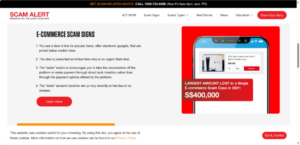 Consider using a dark web scanner. With just your email address, it can reveal whether any of your financial data—such as credit cards or other account details—has been compromised and is accessible to hackers and fraudsters. The more informed you are about how these scams work, the better equipped you’ll be to defend against them and keep your finances safe.
Consider using a dark web scanner. With just your email address, it can reveal whether any of your financial data—such as credit cards or other account details—has been compromised and is accessible to hackers and fraudsters. The more informed you are about how these scams work, the better equipped you’ll be to defend against them and keep your finances safe.
Bank scammers have devised a range of deceitful tactics to infiltrate your accounts and steal your funds. Among the most prevalent methods employed to access your financial details and assets are:
First on the list are overpayment scams, which primarily target online sellers. In this scenario, a fraudster masquerades as a buyer, sending you a check, money order, or some form of payment confirmation that exceeds the agreed purchase price. They will then request that you refund the excess amount via an online transfer or wire service. Unfortunately, the initial payment is bogus, resulting in you losing both the refunded amount and potentially the item sold as well.
If you find yourself falling victim to such scams, it’s crucial to recognise that your financial security and identity may be compromised. To protect yourself against these threats, consider trying Aura’s identity theft protection service for free for two weeks.
Next up are employment scams, which often prey on job seekers who may need to be more cautious about sharing personal information. Scammers post enticing job listings and then request identification for verification purposes during what they claim is the hiring process. With access to sensitive data like your ID or Social Security number, they can easily steal your identity and gain entry into your bank account. If you’re currently looking for work, implementing fraud detection and credit monitoring services can help ensure that no one misuses your credentials.
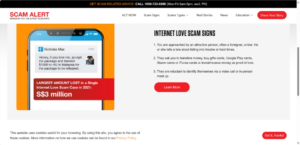
Additionally, some fake recruiters charge fees under pretences in exchange for securing job placements, or employers send checks asking you to cash them on their behalf or requesting that you repackage goods before sending them back.
Lastly, automatic debit scams—also known as unauthorised withdrawal scams—involve illicit deductions from checking accounts without consent.
Staying vigilant against these common bank scams is essential in safeguarding both your finances and personal information in today’s digital landscape.
Unsolicited check fraud occurs when you receive a check in the mail that you never requested, typically claiming to be a rebate or refund for an overpayment. However, instead of being free money, these checks often contain fine print that obligates you to enter into a loan agreement, membership, or other expensive long-term obligations.
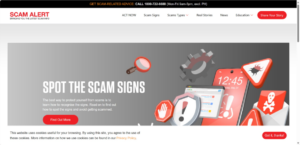
In addition to this type of fraud, there are also government impostor scams that have become increasingly prevalent. In the fiscal year 2022 alone, Americans reported 1.8 million complaints about robocalls, many of which involved scammers impersonating officials from agencies like Medicare, the FBI, or the IRS. During these deceptive communications—whether they come through calls, emails, or texts—the impostors may threaten legal action against you for unpaid debts and insist that payment must be made with gift cards. Alternatively, they might inform you that you’ve won a prize but need to pay taxes or fees before it can be released. In both scenarios, the goal is to either extract money from you or gather personal information for further fraudulent activities. For more examples of such scams masquerading as government communications, visit usa.gov. It’s essential to remember that legitimate government entities and banks will never request sensitive information via email or text message; if you’re uncertain about a communication’s authenticity, it’s best to hang up and contact the agency directly using their official phone number.
Another common threat is phishing scams—social engineering attacks where victims receive seemingly legitimate emails or texts purportedly from well-known service providers like Apple or their bank. These messages often warn recipients about suspicious activity on their accounts and prompt them to reset their passwords through provided links. Unfortunately, clicking on these links can lead individuals to inadvertently share personal information with scammers or download malware onto their devices that could compromise their email security as well. While phishing attempts can also occur via text messages and phone calls, phishing emails remain the most frequent method used by fraudsters; in fact, there was a significant increase in advance fee fraud schemes initiated through email—up by 1,000 incidents in just one quarter of 2022 alone.
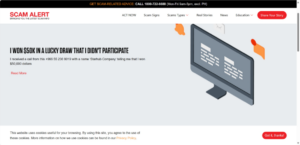
Unsolicited check fraud occurs when you receive a check in the mail that you never requested, typically claiming to be a rebate or refund for an overpayment. However, instead of being free money, these checks often contain fine print that obligates you to enter into a loan agreement, membership, or other expensive long-term obligations.
In addition to this type of fraud, there are also government impostor scams that have become increasingly prevalent. In the fiscal year 2022 alone, Americans reported 1.8 million complaints about robocalls, many of which involved scammers impersonating officials from agencies like Medicare, the FBI, or the IRS. During these deceptive communications—whether they come through calls, emails, or texts—the impostors may threaten legal action against you for unpaid debts and insist that payment must be made with gift cards. Alternatively, they might inform you that you’ve won a prize but need to pay taxes or fees before it can be released. In both scenarios, the goal is to either extract money from you or gather personal information for further fraudulent activities. For more examples of such scams masquerading as government communications, visit usa.gov.
It’s essential to remember that legitimate government entities and banks will never request sensitive information via email or text message; if you’re uncertain about a communication’s authenticity, it’s best to hang up and contact the agency directly using their official phone number. Who are the usual targets of bank scammers? Sadly, no one is entirely immune to bank scams. However, these fraudulent schemes often focus on individuals who may lack experience or technological know-how, particularly young adults who have recently opened their first bank accounts and senior citizens. For instance, data from the FTC indicates that individuals in their 20s are over twice as likely to be deceived by fake check scams compared to older populations. Nonetheless, anyone who doesn’t stay vigilant or is unaware of prevalent scamming techniques can quickly become a victim.

Is it possible for someone to misuse my identity for bank fraud? Absolutely. According to the FTC, identity theft was the most frequently reported form of fraud in 2020. When scammers obtain your details through methods like phishing, they can engage in various malicious activities: accessing your bank account to deplete your fund, establishing new accounts in your name and taking out loans, splurging on shopping sprees with your money, or even tapping into government benefits such as unemployment assistance. Additionally, these scammers might infiltrate your email and social media profiles to reach out to friends and family, attempting to exploit their trust in you for further fraudulent activities.
To safeguard yourself against identity theft and fraud risks, consider protecting yourself with Aura’s $1 million identity theft insurance. You can try Aura for 14 days to determine if it meets your needs.
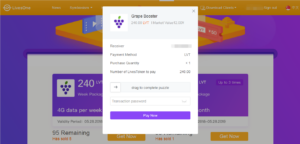
Have you fallen victim to a bank scam? If so, you must act quickly. Banks and insurance policies usually require prompt reporting of financial fraud; delays could leave you responsible for losses incurred due to scams.
Another common threat is phishing scams—social engineering attacks where victims receive seemingly legitimate emails or texts purportedly from well-known service providers like Apple or their bank. These messages often warn recipients about suspicious activity on their accounts and prompt them to reset their passwords through provided links. Unfortunately, clicking on these links can lead individuals to inadvertently share personal information with scammers or download malware onto their devices that could compromise their email security as well. While phishing attempts can also occur via text messages and phone calls, phishing emails remain the most frequent method used by fraudsters; in fact, there was a significant increase in advance fee fraud schemes initiated through email—up by 1,000 incidents in just one quarter of 2022 alone.
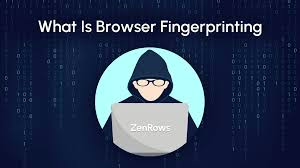
Bank scammers often target specific groups, and unfortunately, no one is entirely safe from their tactics. Typically, these con artists tend to prey on individuals who may need to be better-versed in technology or financial matters. This includes young adults who have just opened their first bank accounts and older individuals, particularly seniors. For example, data from the FTC reveals that people in their twenties are more than twice as likely to fall victim to fake check scams compared to older age groups. However, anyone who isn’t cautious or lacks awareness of standard scamming methods can easily find themselves trapped.

Identity theft is a significant concern as well; it’s indeed possible for someone to exploit your identity for fraudulent purposes. The FTC reported that identity theft was the most commonly reported type of fraud in 2020. Scammers can acquire your personal information through tactics like phishing and then engage in a variety of harmful activities—such as draining your bank account, opening new accounts under your name to take out loans, going on shopping sprees with your funds, or even accessing government benefits like unemployment assistance. Moreover, these fraudsters might hack into your email and social media accounts to contact friends and family members, leveraging those relationships for further deceitful schemes.
To protect yourself against the risks of identity theft and fraud, consider investing in Aura’s $1 million identity theft insurance. You can explore Aura free for 14 days to see if it suits your needs.
If you have already fallen victim to a bank scam, you must take immediate action. Banks and insurance companies typically require prompt reporting of any financial fraud; waiting too long could result in you being held responsible for any losses incurred due to these scams.
It’s essential to keep a close eye on your credit report and bank statements. Scammers often start their attacks in subtle ways to avoid being noticed, so vigilance is vital. Watch for any unusual transactions on your bank statement or unfamiliar accounts that might indicate identity theft.
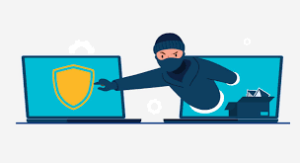
To help safeguard against this threat, consider utilising an identity theft protection service like Aura, which can monitor your credit and financial statements, alerting you to potential fraud that your bank might overlook. Signing up for such a service could provide peace of mind; Aura’s highly-rated protection covers all aspects of your sensitive personal data, online accounts, and financial activities for any signs of fraudulent activity. Should a scammer attempt to infiltrate your accounts or finances, Aura is there to assist you in taking swift action before significant damage occurs. For immediate protection during this vulnerable time, you might want to take advantage of Aura’s 14-day free trial.

Maxthon
To safeguard your online banking details while using the Maxthon browser, there are several essential steps you can take. First and foremost, it’s crucial to create strong passwords for your banking account. This means developing unique and intricate passwords that mix uppercase and lowercase letters with numbers and special characters. Steer clear of easily guessable information such as birthdays or the names of pets.
Next, if your bank offers Two-Factor Authentication (2FA), be sure to enable it. This feature adds a security layer by requiring you to input a code sent to you via text or email alongside your password.
you via text or email alongside your password.
Keeping your Maxthon browser updated is also vital; make a habit of checking for updates regularly. New versions typically come with security enhancements and patches that help protect against potential vulnerabilities.
Another essential practice is frequently clearing your browsing data. By regularly removing your history, cache, and cookies, you eliminate any stored sensitive information that hackers could exploit if they gain access to your device.
Utilising Maxthon’s privacy mode is another effective way to enhance security during online banking sessions. This feature allows you to browse without saving any data, such as cookies or site information, from those sessions.
In addition, consider installing reputable security extensions or antivirus plugins compatible with Maxthon. These tools can offer real-time protection against threats such as phishing attacks and malware.
It’s also wise to remain vigilant about phishing scams. Always verify the URL of the banking website before logging in, and exercise caution regarding links sent through emails or messages purporting to be from your bank—only click them if you’re confident they’re legitimate.

Finally, remember to log out after completing any transactions in your online banking session. Doing so helps prevent unauthorised access should someone else use your device afterwards.
Implementing these strategies can significantly enhance the security of your online banking endeavours when using the Maxthon browser.
